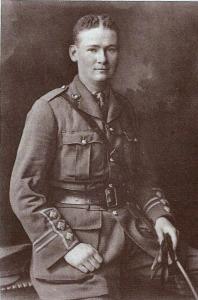
|

|
| Captain Stafford Dudley SOMERVILLE | |
|
1/5th Battalion King’s Own Yorkshire Light Infantry Date of birth: 8th May 1893 Date of death: 5th July 1916 Killed in action aged 23 Buried at Authuille Military Cemetery Row G Grave 12 |

|
| Stafford Dudley Somerville was born at Thayetmo in Burma on the 8th of May 1893 the elder son of Lieutenant Colonel Stafford James Somerville, 1st Battalion Inniskilling Fusiliers, and Florence Adelaide (nee White) Somerville of 34 York Street, Portman Square in London. He was christened at the Church of St John the Baptist, Thayetmo on the 6th of August 1893. He was educated at Lancing College where he was in News House from September 1907 to July 1910 and where he was a member of the Officer Training Corps. On leaving school he was articled to Messrs Baxter Loxley and Somerville, solicitors of Doncaster and had passed two legal examinations. He lived at 55 High Street, Doncaster. He applied for a commission in the 5th Battalion King’s Own Yorkshire Light Infantry on the 5th of March 1911 in an application which was supported by Mr. W.H. Ferguson, a Housemaster at Lancing College. He was commissioned as a 2nd Lieutenant in the battalion on the 3rd of April 1911. He underwent the examination for officer of the Territorial Army at Pontefract on the 6th of October 1911 and passed in all subjects. He was promoted to Lieutenant on the 1st of July 1914. Following the outbreak of war he was mobilised for service on the 5th of August 1914 and was promoted to Captain on the 2nd of January 1915. He embarked for France on the 18th of August 1915. He applied for a permanent commission in the regular army on the 1st of April 1916 in an application which was supported by Lieutenant Colonel C.C. Moxon, Commanding Officer of the 1/5th Battalion King's Own Yorkshire Light Infantry. He underwent a medical examination on the 10th of April 1916 at which it was recorded that he was six feet tall, that he weighed 136lbs and that he needed glasses as he was near sighted. In his application he expressed a preference for the Army Service Corps, the King's Own Scottish Borderers or the King's Own Yorkshire Light Infantry and was granted a permanent commission in his regiment on the 4th of May 1916. At 3am on the morning of the 1st of July 1916, the opening day of the Battle of the Somme, the 1/5th Battalion King’s Own Yorkshire Light Infantry was moved into assembly trenches in Aveluy Wood to support of 32nd Division's attack at Thiepval. In the event they were not called upon and they suffered twenty casualties from shellfire during their time there. They were relieved and moved to the Thiepval Wood sector. On the 3rd of July two of their companies relieved two companies of the York and Lancaster Regiment in the old German front line and on the 4th they were attacked by the enemy but were successful in repulsing the attack after a close fought bombing battle amid heavy rain and thunder. At 4 am on the 5th of July the battalion moved forward to seize more of the German line to the north of the River Ancre. The attack was to be made by A Company with B Company in support. When the attack began it was met with, shrapnel fire, and intense rifle and machine gun fire which made casualties of every officer in the lead company and caused the attackers to fall back. The Germans responded by immediately counterattacking and during seven such attacks they broke into the British trenches three times and fought hard before being ejected. During the day six officers were killed or missing with eight being wounded and two hundred and sixty nine other ranks were killed, wounded or missing. Stafford Somerville was among the dead. A brother officer wrote:- "We have just had a most awful time on July 5th, four officers killed and eight wounded. The Germans were on three sides of us, and attacked us incessantly, chiefly on the flank held by C Company. The senior officer of this company being absent, the Colonel sent for Captain Somerville, and with every confidence, put him in command; seven times the Germans attacked our lines and three times penetrated and in one of these attacks Captain Somerville was hit by a bomb and killed while driving the enemy back. I saw Somerville at 9 o'clock on the 4th and he was perfectly calm, in spite of the attacks during the day, he only wanted reinforcements and more bombs both of which I sent up." The Battalion Chaplain wrote:- "Captain Somerville played a very prominent part at a very critical time. Man after man who was present at the time has told me what magnificent and fearless work he was doing at the moment he was killed." His Commanding Officer wrote:- "I greatly deplore the losses of my officers and none more so than the loss of young Somerville. He was a gallant lad and displayed the greatest coolness and courage in a very tight corner. I am sure it will be a measure of comfort to you to know that up to the last he upheld the highest traditions of a British officer." His father was killed in action on the 17th of August 1917 while attached to the 1st Battalion Royal Irish Fusiliers. Stafford Somerville was engaged to be married after the war to the daughter of the Archdeacon of Doncaster. His mother applied for his medals in November 1921. |
|
| News House |
Back